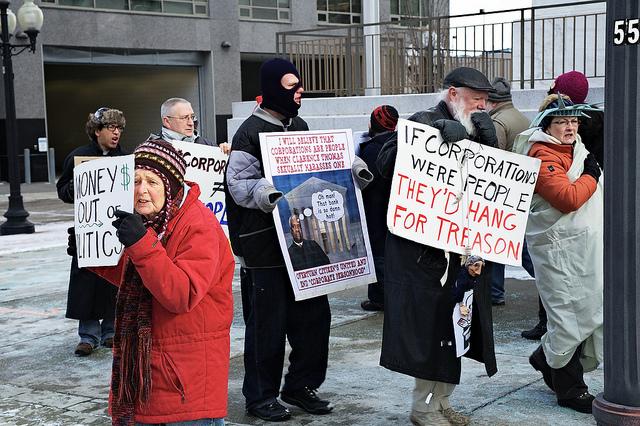You might not remember this, or have ever paid attention in the first place, and we try not to get too political on here anyway, but 4 years ago a lobbying group named Citizens United was the plaintiff in a big Supreme Court case. The group wanted to televise a film that was critical of a prominent Democrat (Hillary Clinton, if it matters.) The Federal Elections Commission said no, you can’t do that because it violates a 2002 law that forbids organizations such as corporations and unions from espousing such political speech within 2 months of a general election. (The passage of that 2002 law, by the way, is why some political commercials now end with the phrase “I’m Candidate X and I approved this message.”)
Citizens United said the 2002 law is malarkey, we’re still Americans here and free speech is free speech. Just because some people choose to organize themselves into a unit, they don’t vacate their right to support a political position or a candidate. People such as the imbeciles in the picture above can’t understand such a nuanced argument, so they resorted to the simplest slogans that could fit on a placard. Equating “corporations” with “people” was a popular mantra of the time, one intended to shock. How dare the Earth-poisoners at Monsanto or modern-day slavemasters at Walmart think they have any claim to flesh-and-blood personhood! (Why, they can get in line behind the unborn babies.) The folks making the comparison had never bothered to look at the etymology of the word “corporation”, or even understand the most basic principles of a corporation.
“Corporation” has the same root as the words “corpse”, “corporeal”, etc. It’s a body. A corporation is an artificial person, and not in the sense of a robot or a cyborg. It’s an entity in the eyes of the law, an entity created to facilitate business.
If corporations didn’t exist, every business would be run by a sole proprietor or a partnership. Those people could then be liable for debts beyond their personal ones. Put $20,000 of your own money into a business, incur a $150,000 loss when your supplier splits town and your customers cancel their orders, then spend the rest of your life with a negative net worth. Hey, you’d be just like those pathetic debt bloggers!
That’s why any ambitious business sets up as an entity that permits limited liability, as opposed to general liability. “Limited” means that as the owner, you’re only liable for what you put into the company. In the previous example, your losses max out at $20,000. It’s also why as an owner of a large corporation, which of course is what you are when you buy shares in Nokia or Alcatel-Lucent, you can’t lose more than your initial investment. No matter how badly the company performs. Procter & Gamble management isn’t going to call you and say, “Hey, Jennifer? Thanks a lot for the $6500 from your last stock purchase, that really helped out a lot. But we’re stretched this quarter, and I mean stretched. Turns out our new ‘tearless’ shampoo is blinding customers left and right. What I’m saying is, what you’ve forked over so far just isn’t going to cut it. Daddy needs another 5 large, and not tomorrow.”
If it’s good enough for multinationals, it should be good enough for you. Unless it’s run by a complete idiot, even the most modest auto repair shop or coffee bar will pay the licensing fee to the relevant state authority and register as a limited liability company or corporation. It’s a small up-front cost that saves you gigantically on taxes down the road. A business registered as anything less complex than a corporation pays both personal income tax and corporate tax, the worst of both worlds. With a limited liability company, you pay only corporate tax, which is typically going to be less than personal income tax.
Our tax code is famously arcane and nonsensical in places, but this is one twist they got right. If there was no added incentive for creating a business, no one would ever do so and the economy would remain static. You need to encourage people to take risks. That doesn’t mean covering their losses, as corporations go bankrupt all the time. It just means making it attractive for people to go into business. That way, if everything works out, they can a) sell goods and services that make customers happy and b) hire people to make/sell/lease/provide those goods and services.
The best part is that even just one person can incorporate. To keep this in language that’s legally and technically sound, you can create a corporation that’s coextensive with just you. You and the corporation are still separate entities as far as getting sued, representing one entity or the other in court, paying taxes, etc., but for practical purposes you’re one and the same. With all the benefits illustrated above. You still need to have a legitimate business behind this – financial accounting, audio post-production, furniture repair, gutter cleaning, tree surgery, whatever – but once you create a limited liability company you’ll be miles ahead of the suckers who can’t understand why life is so hard and why Uncle Sam takes an ever-increasing bite that renders forward movement impossible.
Embrace corporatehood. Start here. Chapter X.




